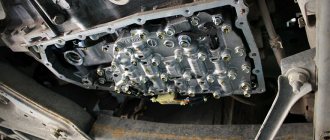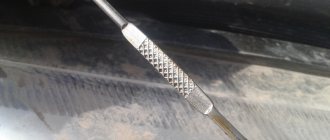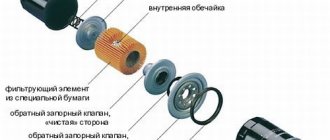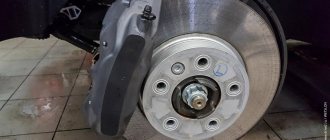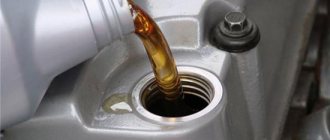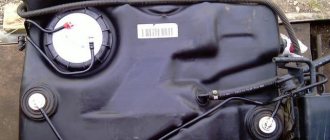Technical experts recommend changing the power steering oil every two years or after 100 thousand kilometers; in some cases, this procedure will need to be carried out earlier, for example, when operating the car in difficult conditions. The need to change the power steering fluid in Focus 2 may be indicated by:
- the appearance of a leak;
- creaking sound of power steering;
- difficult rotation of the steering column;
- the steering wheel turns only with great effort;
- decrease in fluid volume;
- change in oil color;
- the smell of burnt oil appears.
To determine whether the condition of the oil matches the color, simply apply a couple of drops to white paper or fabric.
About power steering
This element is intended, first of all, to increase the comfort of the car. The hydraulic booster is one of the components of the steering mechanism. Its main task is to provide so-called feedback between the driver and the car while driving the latter. In addition, power steering improves vehicle stability while driving.
Changing the oil in the hydraulic booster is a mandatory process that ensures the functionality of the device. However, automakers do not regulate this process in any way. That is, they do not indicate in the technical specifications when it is necessary to fill in new oil in the Ford Focus 2 power steering.
Power steering fluids
Power steering oil serves as the link between the piston and the hydraulic pump. It lubricates device parts, reduces friction, prevents overheating, corrosion and oxidation.
Power steering fluids differ in oil composition, level of density and viscosity, and mechanical properties.
There are fundamental differences between synthetic and mineral liquids. The former are recommended to be used with permission from the vehicle's operating instructions, since some components of synthetic oils can adversely affect rubber parts.
Mineral fluids are much cheaper and more versatile; they do not cause any harm to rubber and polymers, which is why they are very popular among car owners.
Oils also differ in color - red, yellow and green liquids have specific properties, composition and areas of application. The choice of oil color for power steering depends not on the desire of the driver, but on the recommendations of the car manufacturer.
When to pour oil?
Experts advise replacing the oil fluid in the power steering every 2-3 years or when the next 100 thousand kilometers are reached. If this is not done, then over time the lubricant will lose its original properties. Various deposits appear in it, contaminating the material.
As a result, such processes lead to a decrease in pressure in the hydraulic system. Therefore, in the future, you will have to put in much more effort to turn the steering wheel.
According to the official documentation that comes with the Ford Focus 2, fluid is poured into the hydraulic system only once during the production of the vehicle. But in practice the situation looks different. This is especially true when the machine has been in use for many years. To avoid the formation of deposits and other negative consequences, it is recommended to regularly check the oil level.
The following signs may indicate the need to replace the lubricant:
- Power steering operates with a characteristic sound;
- leak detected;
- deterioration of the steering column;
- Every time you turn the steering wheel, it takes a lot of effort.
Which one to pour?
Power steering fluid for Ford is a synthetic material that ensures stable and safe operation of the unit. The consumable substance can perform its functions at temperatures from -40 to +120 degrees. If we talk about a specific brand of steering oil for Ford Focus 2, then you can use several options: either Ford WSA/M2C195/A, or Ravenol-PSF. If it is not possible to purchase this oil, then you can buy another, but analyze the requirements of the car manufacturer and the composition of the consumable material.
Liquid WSA/M2C195/A
Level check
Checking the oil level in the hydraulic system is carried out in several stages:
- The engine must be turned off and wait until it has cooled down sufficiently.
- All components that make up the hydraulic system are wiped with a rag or cloth.
- Check the oil level in the power steering reservoir. If necessary, you can add lubricant.
- Once the work is completed, the engine starts again. With the engine running, turn the steering wheel in different directions.
It is important to note that checking the oil level and replacing it is carried out using different algorithms.
What kind of fluid to pour into the power steering
Based on this, the answer to the question “what kind of oil to pour into the power steering” is obvious - recommended by the manufacturer of your car. Often information is indicated on the expansion tank or cap. If there is no technical documentation, call an authorized center and ask.
In any case, experiments with steering are unacceptable. Not only your safety, but also that of those around you depends on the health of your power steering.
| shuric77777 Either Motocraft fluid is poured in (for gourmet or automatic transmission), or simply Mercon V (it also goes into automatic transmission). |
| In the power steering it can be in the box no |
| where is the reservoir with power steering fluid located? 8)) I have never looked, tomorrow I will check all the fluids to see if they are normal. thanks for the tip =0) |
| car model | Recommended liquid |
| Audi 80, 100 (audi 80, 100) | VAG G 004 000 M2 |
| Audi A6 C5 (audi a6 c5) | Mannol 004000, Pentosin CHF 11S |
| Audi a4 (audi a4) | VAG G 004 000M2 |
| Audi a6 c6 (audi a6 c6) | VAG G 004 000M2 |
| BMW e34 (BMW e34) | CHF 11.S |
| BMW E39 (BMW E39) | ATF Dextron 3 |
| BMW E46 (BMW E46) | Dexron III, Mobil 320, LIQUI MOLY ATF 110 |
| BMW E60 (BMW E60) | Pentosin chf 11s |
| BMW x5 e53 (BMW x5 e53) | ATF BMW 81 22 9 400 272, Castrol Dex III, Pentosin CHF 11S |
| VAZ 2110 | Pentosin Hydraulic Fluid (CHF,11S-tl, VW52137) |
| VAZ 2112 | Pentosin Hydraulic Fluid (CHF,11S-tl, VW52137) |
| Volvo s40 (volvo s40) | Volvo 30741424 |
| Volvo xc90 (volvo xc90) | VOLVO 30741424 |
| Gas (Valdai, Sobol, 31105, 3110, 66) | Mobil ATF 320, Castrol-3, Liqui moly ATF, DEXTRON III, CASTROL Transmax Dex III Multivehicle, ZIC ATF III, ZIC dexron 3 ATF, ELF matic 3 |
| Gazelle business | Mobil ATF 320, Castrol-3, Liqui moly ATF, DEXTRON III, CASTROL Transmax Dex III Multivehicle, ZIC ATF III, ZIC dexron 3 ATF, ELF matic 3 |
| Gazelle next | Shell Spirax S4 ATF HDX, Dexron III |
| Geely MK | ATF DEXRON III, Shell Spirax S4 ATF X, Shell Spirax S4 ATF HDX |
| Geely Emgrand | ATF DEXRON III, Shell Spirax S4 ATF X, Shell Spirax S4 ATF HDX |
| Dodge Stratus | ATF+4, Mitsubishi DiaQueen PSF, Mobil ATF 320 |
| Daewoo Gentra | Dexron-IID |
| Daewoo matiz | Dexron II, Dexron III |
| Daewoo Nexia | Dexron II, Dexron III, Top Tec ATF 1200 |
| Zaz chance | LiquiMoly Top Tec ATF 1100, ATF Dexron III |
| Zil 130 | T22, T30, Dexron II |
| Zyl bull | AU (MG-22A), Dexron III |
| Kamaz 4308 | TU 38.1011282-89, Dexron III, Dexron II, GIPOL-RS |
| Kia Carens | Hyundai Ultra PSF-3 |
| Kia rio 3 (Kia rio 3) | PSF-3, PSF-4 |
| Kia Sorento | Hyundai Ultra PSF-III, PSF-4 |
| Kia Spectra | Hyundai Ultra PSF-III, PSF-4 |
| Kia Sportage | Hyundai Ultra PSF-III, PSF-4 |
| Kia Cerato | Hyundai Ultra PSF-III, PSF-4 |
| Chrysler PT Cruiser | Mopar ATF 4+ (5013457AA) |
| Chrysler Sebring | Mopar ATF+4 |
| Lada Largus | Mobil ATF 52475 |
| Lada Priora | Pentosin Hydraulik Fluid CHF 11S-TL VW52137, Mannol CHF |
| Land Rover Freelander 2 | LR003401 pas fluid |
| Lifan smiley (lifan smily) | Dexron III |
| Lifan solano | Dexron II, Dexron III |
| Lifan X60 (lifan x60) | Dexron III |
| Maz | BRAND R (Oil MG-22-V) |
| Mazda 3 | Mazda M-3 ATF, Dexron III |
| Mazda 6 (mazda 6 GG) | Mazda ATF MV, Dexron III |
| Mazda cx7 (Mazda cx7) | Motul Dexron III, Mobil ATF320, Idemitsu PSF |
| Man 9 (Man) | MAN 339Z1 |
| Mercedes w124 (mercedes w124) | Dexron III, Febi 08972 |
| Mercedes w164 (mercedes w164) | A000 989 88 03 |
| Mercedes w210 (mercedes w210) | A0009898803, Febi 08972, Fuchs Titan PSF |
| Mercedes w211 (mercedes w211) | A001 989 24 03 |
| Mercedes Actros | Pentosin CHF 11S |
| Mercedes atego (mercedes atego) | Dexron III, Top Tec ATF 1100, MV 236.3 |
| Mercedes ML (mercedes ml) | A00098988031, Dexron IID, MB 236.3, Motul Multi ATF |
| Mercedes sprinter | Dexron III |
| Mitsubishi Outlander | Dia Queen PSF, Mobil ATF 320 |
| Mitsubishi Galant | Mitsubishi Dia Queen PSF, Mobil ATF 320, Motul DEXRON III |
| Mitsubishi Lancer 9, 10 (Mitsubishi Lancer) | Dia Queen PSF, Mobil ATF 320, Dexron III |
| Mitsubishi Montero Sport | Dexron III |
| Mitsubishi Pajero | Dia Queen PSF, Mobil ATF 320 |
| Mitsubishi Pajero 4 | Dia Queen PSF, Mobil ATF 320 |
| Mitsubishi Pajero Sport | Dia Queen PSF, Mobil ATF 320 |
| Mtz 82 | in summer M10G2, M10V2, in winter M8G2, M8V2 |
| Nissan Avenir | Dexron II, Dexron III, Dex III, Castrol Transmax Dex III Multivehicle |
| Nissan ad | NISSAN KE909-99931 "PSF |
| Nissan Almera | Dexron III |
| Nissan Murano | KE909-99931 PSF |
| Nissan Primera | ATF320 Dextron III |
| Nissan Teana J31 (Nissan Teana J31) | Nissan PSF KLF50-00001, Dexron III, Dexron VI |
| Nissan Cefiro | Dexron II, Dexron III |
| Nissan Pathfinder | KE909-99931 PSF |
| Opel Antara | GM Dexron VI |
| Opel Astra H (opel astra H) EGR | OPEL PSF 19 40 715, SWAG 99906161, FEBI-06161 |
| Opel Astra J | Dexron VI, General Motors 93165414 |
| Opel Vectra A | Dexron VI |
| Opel Vectra B | GM 1940771, Dexron II, Dexron III |
| Opel Mokka | ATF DEXRON VI" Opel 19 40 184 |
| Peugeot 206 | Total Fluide AT42, Total Fluide LDS |
| Peugeot 306 | Total Fluide DA, Total Fluide LDS |
| Peugeot 307 | Total Fluid DA |
| Peugeot 308 | Total Fluid DA |
| Peugeot 406 | Total Fluide AT42, GM DEXRON-III |
| Peugeot 408 | Total FLUIDE AT42, PENTOSIN CHF11S, Total FLUIDE DA |
| Peugeot partner | Total Fluide AT42, Total Fluide DA |
| Ravon Gentra | Dexron 2D |
| Renault duster | ELF ELFMATIC G3, ELF RENAULTMATIC D3, Mobil ATF 32 |
| Renault Laguna | ELF RENAULT MATIC D2, Mobil ATF 220, Total FLUIDE DA |
| Renault Logan | Elf Renaultmatic D3, Elf Matic G3 |
| Renault Sandero | ELF RENAULTMATIC D3 |
| Renault simbol | ELF RENAULT MATIC D2 |
| Citroen Berlingo | TOTAL FLUIDE ATX, TOTAL FLUIDE LDS |
| Citroen C4 (Citroen C4) | Total Fluide DA, TOTAL FLUIDE LDS, Total Fluide AT42 |
| Scania | ATF Dexron II |
| SsangYong New Actyon | ATF Dexron II, Total Fluide DA, Shell LHM-S |
| SsangYong Kyron | Total Fluide DA, Shell LHM-S |
| Subaru Impreza | Dexron III |
| Subaru Forester | ATF DEXTRON IIE, III, PSF Fluid Subaru K0515-YA000 |
| Suzuki Grand Vitara | Mobil ATF 320, Pentosin CHF 11S, Suzuki ATF 3317 |
| Suzuki Liana | Dexron II, Dexron III, CASTROL ATF DEX II multivehicle, RYMCO, Liqui Moly Top Tec ATF 1100 |
| Tata (truck) | Dexron II, Dexron III |
| Toyota Avensis | 08886-01206 |
| Toyota Carina | Dexron II, Dexron III |
| Toyota Corolla (Toyota Hiace) | Dexron II, Dexron III |
| Toyota Land Cruiser Prado 120 (Toyota Land Cruiser 120) | 08886-01115, PSF NEW-W, Dexron III |
| Toyota Land Cruiser Prado 150 (Toyota Land Cruiser 150) | 08886-80506 |
| Toyota Land Cruiser Prado 200 (Toyota Land Cruiser 200) | PSF NEW-W |
| Toyota Hiace | Toyota ATF DEXTRON III |
| Toyota Chaser | Dexron III |
| UAZ loaf | Dexron II, Dexron III |
| UAZ patriot, hunter | Mobil ATF 220 |
| Fiat Albea | DEXRON III, ENEOS ATF-III, Tutela Gi/E |
| Fiat Doblo | Spirax S4 ATF HDX, Spirax S4 ATF X |
| Fiat Ducato | TUTELA GI/A ATF DEXRON 2 D LEV SAE10W |
| Volkswagen Vento | VW G002000, Dexron III |
| Volkswagen Golf 3 | G002000, Febi 6162 |
| Volkswagen Golf 4 | G002000, Febi 6162 |
| Volkswagen Passat B3 | G002000, VAG G004000M2, Febi 6162 |
| Volkswagen Passat B5 (Volkswagen passat B5) | VAG G004000M2 |
| Volkswagen Transporter T4, T5 (Volkswagen Transporter) | VAG G 004 000 M2 Power Steering Fluid G004, Febi 06161 |
| Volkswagen Touareg | VAG G 004 000 |
| Ford Mondeo 3 (ford mondeo 3) | FORD ESP-M2C-166-H |
| Ford Mondeo 4 | WSA-M2C195-A |
| Ford transit | WSA-M2C195-A |
| Ford Fiesta | Mercon V |
| Ford Focus 1 | Ford WSA-M2C195-A, Mercon LV Automatic, FORD C-ML5, Ravenol PSF, Castrol Transmax Dex III, Dexron III |
| Ford Focus 2 | WSS-M2C204-A2, WSA-M2C195-A |
| Ford Focus 3 | Ford WSA-M2C195-A, Ravenol Hydraulik PSF Fluid |
| Ford Fusion | Ford DP-PS, Mobil ATF 320, ATF Dexron III, Top Tec ATF 1100 |
| Hyundai Accent | RAVENOL PSF Power Steering Fluid, DEXRON III |
| Hyundai Getz | ATF SHC |
| Hyundai Matrix | PSF-4 |
| Hyundai SantaFe | Hyundai PSF-3, PSF-4 |
| Hyundai Solaris | PSF-3, Dexron III, Dexron VI |
| Hyundai Sonata | PSF-3 |
| Hyundai Tucson/Tucson | PSF-4 |
| Honda accord 7 | PSF-S |
| Honda Odyssey | Honda PSF, PSF-S |
| Honda HRV | Honda PSF-S |
| Chery amulet | BP Autran DX III |
| Chery bonus | Dexron III, DP-PS, Mobil ATF 220 |
| Chery very | Dexron II, Dexron III, Totachi ATF Multi-Vehicle |
| Chery indis | Dexron II, Dexron III |
| Chery Tiggo | Dexron III, Top Tec ATF 1200, ATF III HC |
| Chevrolet Aveo | DEXTRON III, Eneos ATF III |
| Chevrolet Captiva | Power Steering Fluid Cold Climate, Transmax Dex III Multivehicle, ATF Dex II Multivehicle |
| Chevrolet Cobalt | DEXRON VI |
| Chevrolet Cruze | Pentosin CHF202, CHF11S, CHF7.1, Dexron 6 GM |
| Chevrolet Lacetti | DEXRON III, DEXRON VI |
| Chevrolet Niva | Pentosin Hydraulic Fluid CHF11S VW52137 |
| Chevrolet Epica | GM Dexron 6 No.-1940184, Dexron III, Dexron VI |
| Skoda Octavia tour | VAG 00 4000 M2, Febi 06162 |
| Skoda Fabia | Power Steering Fluid G004 |
| The data in the table is collected from publicly available sources | |
Oil selection
Power steering oil is selected based on the manufacturer's requirements. The fluid used on the second generation Ford Focus is red or green. This simplifies the process of changing the oil, since the shade of the lubricant poured into the hydraulic system reservoir can be used to determine what type of material was previously used.
Mixing two different products is strictly prohibited.
the second generation Focus power steering with one of the following lubricants:
- WSS-M2C938-A.
- M2C204-A2.
Both products have a relatively high price. They can be replaced with cheaper oils such as Motorcraft Mercon LV XT10QLVC and SWAG/Febi 06161.
For a complete replacement, 1-2 liters of new fluid is enough. In case of topping up, use no more than 800 ml of material.
What oil to fill in power steering Ford Focus 2
Synthetic, semi-synthetic and mineral oils are used for replacement. First of all, when choosing an oil, it is important to focus on the color of the liquid filled in by the manufacturer.
There are three types of oils based on color:
- green - used in Italian-made cars;
- red - Ford Focus, German assembly in Cologne;
- yellow - Russian Vsevolozhsk plant.
Do not mix green oil with any other oil.
Red oils are found in synthetic and mineral types; mixing them is prohibited.
The Ford manufacturer recommends pouring original oil into Ford Focus 2. Such oils are marked as follows:
- red - WSA-M2C-195-A, WSS-M2C-938-A;
- green - WSS-M2C-204-A2.
If you want to save money, you can use cheaper analogues. According to reviews on the Internet, the following have relatively good quality:
- Motocraft Merson LV XT10QLVC (red);
- SWAG 06161 (green).
Replacement algorithm
You can change the power steering oil by contacting a specialized service center. This procedure is also easy to do with your own hands. The second method is preferable because it is less expensive.
Before starting the procedure, you need to prepare a number of tools to facilitate the entire process:
- jack;
- a tube with a fitting 1-1.5 meters long for draining waste liquid;
- container for waste material.
The replacement algorithm looks like this:
- The engine is pre-warmed. This is done so that the liquid drains faster.
- A jack is placed under the front of the car and the car is raised.
- The tank that contains the liquid is disconnected. It is recommended to inspect this container from all sides to ensure that there are no chips or cracks on it.
- Two tubes go to the tank. The top one should be disconnected.
- To drain the oil, a prepared hose is connected to the tank, the second end of which is lowered into a container for waste material.
- Just in case, it is recommended to unscrew the spark plugs from the cylinder. This approach will eliminate the possibility of starting the engine, which could cause air to enter the pump tank. The appearance of the latter subsequently contributes to pump failure.
- The starter starts for 1-2 seconds. You can speed up the draining process by turning the steering wheel to the sides.
- Now you can start filling in new oil. To do this, the tube intended for draining is disconnected, and a hose is fixed in its place.
- After finishing filling in the new fluid, you need to return the spark plugs to their place and start the engine. Having reached 1000 rpm, you need to turn the steering wheel, fixing it for a few seconds at the extreme points. These actions allow you to expel air and distribute the lubricant evenly throughout the reservoir and power steering components.
- Finally, it is recommended to turn off the engine and recheck the oil level.
Replacement Guide
To replace, you must purchase consumables in advance; they must be green. In order for the volume of the substance to be correct, you will need about two liters of oil. In general, the procedure for replacing Focuses is not complicated, but the process will be greatly facilitated if someone helps you. The expansion tank is connected to two lines - one pipe goes to the pump, and the second to the tank, this is called the “return”.
To replace consumables, do the following:
- Prepare a hose equipped with a fitting at the end. Its length must be at least a meter, and the diameter of the hose must match the return hose. A similar hose may be needed, but its length may be shorter, and there should be a plug at the end of the pipe.
- Take a container into which you will drain the used oil (preferably with wide edges). Remove the expansion tank by first unscrewing the fixing bolts.
- Using pliers with elongated and curved ends, it is necessary to move the clamp from the return pipe, which is fixed on the container, to the side.
- Remove the return line and install the fitting of the prepared pipe. Instead of this line, it is necessary to install a pipe with a plug.
- Remove the cap from the expansion tank and fill it with new consumables.
During flooding, you need to start the engine; you will need an assistant for this. When draining used oil, you need to monitor the color; when you see that new fluid is coming out of the system, you can turn off the engine. If air gets into the system during the process, you will have to expel it, otherwise the air lock will prevent the unit from working normally. After replacing the fluid, the steps for assembling the system elements are performed in the reverse order.
Loading …
Replacement process
As already noted, in second-generation Ford Focus cars only green liquid should be used. Before the actual replacement is carried out, you need to find the right oil. The replacement process itself is not complicated, and even beginners can handle it. But it’s better if someone helps in this matter - this will make the operation even simpler.
The tank is connected to the system with two hoses. One of them goes to the pump, the other goes back to the tank. In order to change the power steering oil on a Ford Focus, you need to prepare a hose in advance. Its length must be no less than one meter. The diameter corresponds to the size of the return hose. There should be a fitting at one end. Additionally, you may need a pipe of the same size. But there should be a plug at the other end.
The process looks like this:
- Take any container with wide edges. Its volume should be up to 3 liters.
- The open part of the hose is lowered into it.
- Then remove the power steering reservoir and unscrew the mounting screws.
- Next, use pliers to dismantle the clamp on the return hose, which is attached to the tank.
- Then the element is removed from the tank. A fitting from a previously prepared hose is installed in it, and a second prepared one is placed in its regular place. It has a plug at the end.
- Then unscrew the cap from the tank and fill in new fluid.
Main functions and characteristics of power steering oils
Power steering fluid performs the following functions:
- pressure transmission between the pump and actuator units;
- lubrication and cooling of amplifier structural elements;
- removal of wear products;
- reduction of friction between elements.
The working fluid in power steering is a liquid, divided into two categories:
- Mineral based, which is not aggressive to rubber O-rings. The oil additionally protects the material, preventing it from cracking due to temperature changes. The disadvantage is increased viscosity (especially in cold weather), short service life and a tendency to intensive foam formation.
- Synthetic liquids that destroy rubber parts (except for products made from special materials). The oil has an increased cost, which is compensated by an increased resource, as well as a uniform viscosity that is little dependent on temperature.
How to make the replacement correctly?
You can do it yourself, but if you have an assistant, everything will go much faster. The reservoir containing the power steering fluid interacts with several hoses at the same time. The first is directed to the pump, the second is “return”.
The specific algorithm for performing the work will be described a little later. At this point you should understand the existing features. When it’s time to fill in new fluid, this should be done while the engine is running. Look carefully at the color of the liquid coming out of the tank. When a new one leaks, immediately turn off the engine. Avoid even minimal air entry into the internal combustion engine. Otherwise, additional difficulties may arise. Having figured out in general terms how to change power steering oil, you need to figure out what needs to be poured.
How to choose power steering oil
The hydraulic system uses a synthetic substance that must meet the following parameters:
- maximum operating temperature from 110°C;
- stable viscosity of the medium regardless of temperature and load level;
- the presence of additives to improve the efficiency of functioning under pressure;
- resistance to foaming;
- safety for the materials from which seals and hoses are made.
Today, manufacturers offer power steering fluids that vary:
- by type of base (synthetic and mineral);
- by viscosity;
- according to the characteristics of additives;
- by performance properties, etc.
On sale you can find power steering fluid in red, yellow and green colors, and red and green compositions are mineral and synthetic, and:
- red - only for cars with automatic transmission;
- yellow - universal, for “mechanics” and “automatic”;
- green - only for cars with manual transmission.
Important! Synthetic and mineral oils should absolutely not be mixed, even if they have the same color! Using two types of oil at the same time results in the formation of clots, blockage of the pump and holes in the steering rack, and system breakdown.
When choosing power steering fluid, you should follow the recommendations of the car manufacturer and use the same composition that is poured into the system, or its equivalent.
Synthetic compounds may only be poured into the system for which they are specified by the vehicle manufacturer. The use of synthetics instead of mineral oil will lead to damage to the sealing elements and hoses, as a result of which the hydraulic booster will lose its seal and fail. Even pre-flushing the system will not get rid of this problem.
Types of fluids for popular cars: table
| Red (mineral or synthetic) | Dexron II | Daewoo Nexia, Passat until 2005. |
| Dexron III | Toyota Avensis, Camry, Patrol, Corolla until 1997; BMW until 1994; Korean Chevrolet Lacetti and Cruz | |
| Dexron IV | Chevrolet Aveo after 2012. | |
| New PSF-3 | Korean cars, including KIA, Hyundai | |
| Yellow | Mercedes, some other cars | |
| Green (synthetic or mineral) | VAG cars; French cars with the exception of Renault Duster, Logan, Sandero | |
It is allowed to mix power steering fluids from different manufacturers with each other if they match in type (mineral with mineral, synthetic with synthetic), color and characteristics.
Why is low-quality oil dangerous?
Purchasing counterfeit products can harm human health and damage vehicle components. When choosing power steering fluid, you must follow the same rules as when buying motor oil. The lubricant must be produced by a reputable manufacturer and purchased from an official representative. This will minimize the risk of purchasing low-quality oil and the consequences of its use.
Loss of properties at elevated temperatures
Low-quality oil begins to break down at elevated temperatures, clots form in it, which clog the pump and lines. The minimum problem in this case will be an increase in the force on the steering wheel, but the possibility of component failure cannot be ruled out.
During operation, the liquid reaches temperatures up to +85 ºС (cases of stronger heating have been noted). The radiator in the system reduces the temperature, but in hot weather or when driving intensively, heating is inevitable.
Release of hazardous vapors
The additive complex begins to boil away at elevated temperatures. This is especially true for cheap components that are not suitable for such operating conditions. The formed vapors enter from the engine compartment into the air supply channels for the vehicle interior. Theoretically, they can have a negative impact on the driver and passengers.
What's suitable?
What to fill? This question interests every motorist whose car is equipped with a hydraulic booster. Speaking specifically about the second generation Focus, you can buy WSA/M2C195/A. It is worth paying attention to Ravenol-PSF. If it is not possible to purchase one of the proposed options, then when choosing an oil, look at the existing composition. It is important that the parameters exactly meet all the requirements of the manufacturer.
You definitely need to figure out how much liquid to add. For Focus 2 you will need about two liters, and therefore there is no point in buying more.
How to change power steering oil
There are two repair methods:
- with a complete oil change;
- with partial drainage of liquid.
To carry out independent replacement, you will need materials and equipment:
- new clean oil in the quantity specified in the technical documentation;
- a medical syringe with a volume of 40-50 ml, necessary for pumping out liquid from the tank;
- extension tube that fits onto the syringe nozzle;
- a container for collecting used oil (usually an old canister or a 1.5-2.0 liter plastic bottle is used);
- rags;
- gasoline or carburetor cleaner (for washing parts);
- funnel;
- a screwdriver or special pliers for removing clamps;
- set of heads (depending on the design of the car).
Oil drained from the power steering must be disposed of; pouring it onto the ground or into a sewer is prohibited.
Installing the car on a lift
When changing the oil completely, it is necessary to hang the front wheels of the car, which will allow you to rotate the steering wheel with the engine off. The car is installed on a lift according to the standard procedure. In the absence of equipment, it is possible to use the installation of stands under the thresholds. If a partial fluid change is being carried out, a lift is not required.
